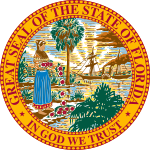
The speaker of the United States House of Representatives, commonly known as the speaker of the House, is the presiding officer of the United States House of Representatives. The office was established in 1789 by Article I, Section 2 of the U.S. Constitution. The speaker is the political and parliamentary leader of the House and is simultaneously its presiding officer, de facto leader of the body's majority party, and the institution's administrative head. Speakers also perform various other administrative and procedural functions. Given these several roles and responsibilities, the speaker usually does not personally preside over debates—that duty is instead delegated to members of the House from the majority party—nor regularly participate in floor debates.
The 1860–61 United States House of Representatives elections were held on various dates in various states between August 6, 1860 and October 24, 1861, before or after the first session of the 37th United States Congress convened on July 4, 1861. The number of House seats initially increased to 239 when California was apportioned an extra one, but these elections were affected by the outbreak of the American Civil War and resulted in over 56 vacancies.
In American politics, a conservative Democrat is a member of the Democratic Party with conservative political views, or with views that are conservative compared to the positions taken by other members of the Democratic Party. Traditionally, conservative Democrats have been elected to office from the Southern states, rural areas, the Rust Belt, and the Midwest. In 2019, the Pew Research Center found that 14% of Democratic and Democratic-leaning registered voters identify as conservative or very conservative, 38% identify as moderate, and 47% identify as liberal or very liberal.
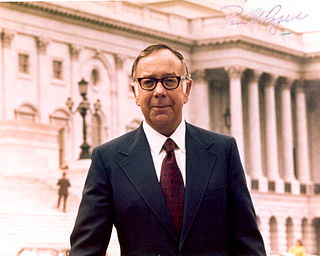
Paul Grant Rogers was an American lawyer and politician from the U.S. state of Florida. A Democrat, Rogers served in the U.S. House of Representatives as the member from Florida's 11th congressional district. He was chairman of Research America from 1996 to 2005.

Robert Winthrop Kean was an American Republican Party politician and member of one of the nation's oldest and longest serving political families.

James Anthony Burke was a United States Representative from Massachusetts from 1959 to 1979.
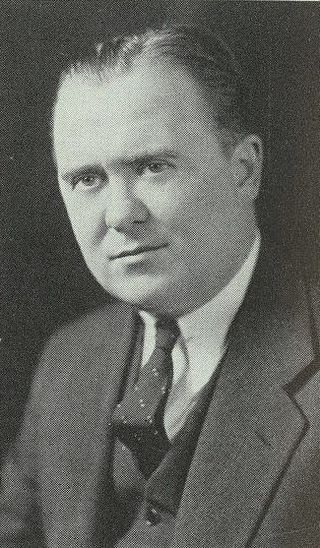
Donald Lawrence O'Toole was an American lawyer and politician who served eight terms as a United States representative from New York from 1937 to 1953.

Dwight Laing Rogers was a U.S. Representative from Florida.
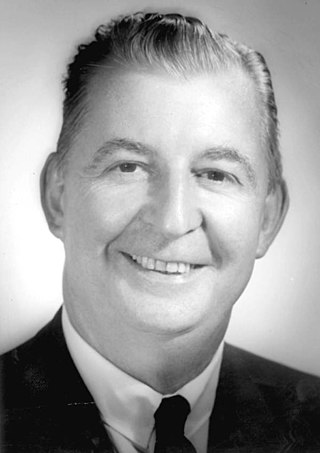
J. Herbert Burke was a Republican U.S. Representative from Florida who served from 1967 to 1979.
Women have served in the United States House of Representatives, the lower chamber of the United States Congress, with the Senate being the upper chamber, since 1917 following the 1916 election of Republican Jeannette Rankin from Montana, the first woman in Congress. In total, 375 women have been U.S. representatives and seven more women have been non-voting delegates. As of March 7, 2023, there are 125 women in the U.S. House of Representatives, making women 28.7% of the total. Of the 382 women who have served in the House, 251 have been Democrats and 131 have been Republicans. One woman has been Speaker of the House, Democrat Nancy Pelosi of California.

Edward Joseph Hart was an American Democratic Party politician who represented New Jersey's 14th congressional district in the United States House of Representatives from 1935 to 1955.
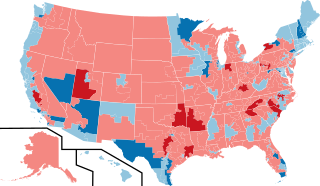
The 2012 United States House of Representatives elections were held on November 6, 2012. It coincided with the reelection of President Barack Obama. Elections were held for all 435 seats representing the 50 U.S. states and also for the delegates from the District of Columbia and five major U.S. territories. The winners of this election cycle served in the 113th United States Congress. This was the first congressional election using districts drawn up based on the 2010 United States census.

The 1896–97 United States Senate elections were held on various dates in various states. As these U.S. Senate elections were prior to the ratification of the Seventeenth Amendment in 1913, senators were chosen by state legislatures. Senators were elected over a wide range of time throughout 1896 and 1897, and a seat may have been filled months late or remained vacant due to legislative deadlock. In these elections, terms were up for the senators in Class 3.

The 1900–01 United States Senate elections were held on various dates in various states, coinciding with President William McKinley's re-election as well as the 1900 House of Representatives elections. As these U.S. Senate elections were prior to the ratification of the Seventeenth Amendment in 1913, senators were chosen by state legislatures. Senators were elected over a wide range of time throughout 1900 and 1901, and a seat may have been filled months late or remained vacant due to legislative deadlock. In these elections, terms were up for the senators in Class 2.

The 1902–03 United States Senate elections were held on various dates in various states. As these U.S. Senate elections were prior to the ratification of the Seventeenth Amendment in 1913, senators were chosen by state legislatures. Senators were elected over a wide range of time throughout 1902 and 1903, and a seat may have been filled months late or remained vacant due to legislative deadlock. In these elections, terms were up for the senators in Class 3.

The 1878–79 United States Senate elections were held on various dates in various states. As these U.S. Senate elections were prior to the ratification of the Seventeenth Amendment in 1913, senators were chosen by state legislatures. Senators were elected over a wide range of time throughout 1878 and 1879, and a seat may have been filled months late or remained vacant due to legislative deadlock. In these elections, terms were up for the senators in Class 3.

The 2018 United States elections were held on Tuesday, November 6, 2018. These midterm elections occurred during Republican Donald Trump's term. Although the Republican Party increased its majority in the Senate, unified Republican control of Congress and the White House was brought to an end when the Democratic Party won control of the House of Representatives. The election was widely characterized as a "blue wave" election. However, both Donald Trump and House Minority Leader Nancy Pelosi claimed victory after the results of the midterm elections.

The 2022 United States House of Representatives elections were held on November 8, 2022, as part of the 2022 United States elections during incumbent president Joe Biden's term. Representatives were elected from all 435 U.S. congressional districts across each of the 50 states to serve in the 118th United States Congress, as well as five non-voting members of the U.S. House of Representatives from the District of Columbia and four of the five inhabited insular areas. Numerous other federal, state, and local elections, including the 2022 U.S. Senate elections and the 2022 U.S. gubernatorial elections, were also held on the same date.

On December 13, 1955, voters in Michigan's 15th congressional district elected Democrat John Dingell to the U.S. House of Representatives. His father, John Dingell Sr., was the incumbent and died September 19, 1955. The younger Dingell was the longest-serving representative and went on to elect twenty-six more terms until he retired in 2014.
